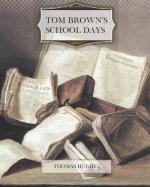“I hope not,” said Tom; “there’ll be no Marylebone match then at the end of the half.”
Some thought one thing, some another, many didn’t believe the report; but the next day, Tuesday, Dr. Robertson arrived, and stayed all day, and had long conferences with the Doctor.
On Wednesday morning, after prayers, the Doctor addressed the whole school. There were several cases of fever in different houses, he said; but Dr. Robertson, after the most careful examination, had assured him that it was not infectious, and that if proper care were taken, there could be no reason for stopping the school-work at present. The examinations were just coming on, and it would be very unadvisable to break up now. However, any boys who chose to do so were at liberty to write home, and, if their parents wished it, to leave at once. He should send the whole school home if the fever spread.
The next day Arthur sickened, but there was no other case. Before the end of the week thirty or forty boys had gone, but the rest stayed on. There was a general wish to please the Doctor, and a feeling that it was cowardly to run away.
On the Saturday Thompson died, in the bright afternoon, while the cricket-match was going on as usual on the big-side ground. The Doctor, coming from his deathbed, passed along the gravel-walk at the side of the close, but no one knew what had happened till the next day. At morning lecture it began to be rumoured, and by afternoon chapel was known generally; and a feeling of seriousness and awe at the actual presence of death among them came over the whole school. In all the long years of his ministry the Doctor perhaps never spoke words which sank deeper than some of those in that day’s sermon.
“When I came yesterday from visiting all but the very death-bed of him who has been taken from us, and looked around upon all the familiar objects and scenes within our own ground, where your common amusements were going on with your common cheerfulness and activity, I felt there was nothing painful in witnessing that; it did not seem in any way shocking or out of tune with those feelings which the sight of a dying Christian must be supposed to awaken. The unsuitableness in point of natural feeling between scenes of mourning and scenes of liveliness did not at all present itself. But I did feel that if at that moment any of those faults had been brought before me which sometimes occur amongst us; had I heard that any of you had been guilty of falsehood, or of drunkenness, or of any other such sin; had I heard from any quarter the language of profaneness, or of unkindness, or of indecency; had I heard or seen any signs of that wretched folly which courts the laugh of fools by affecting not to dread evil and not to care for good, then the unsuitableness of any of these things with the scene I had just quitted would indeed have been most intensely painful. And why? Not because such things would really have been worse than at any other time, but because at such a moment the eyes are opened really to know good and evil, because we then feel what it is so to live as that death becomes an infinite blessing, and what it is so to live also that it were good for us if we had never been born.”




